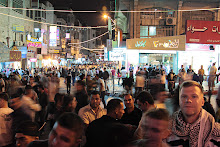- By my reading, the LGBT community in Israel can be conceived as more secular and less religious, and therefore less inclined to support Likud (and more pro-Labor). One of the hallmarks of Israeli democracy is the reliance on coalition government, which, especially to outsiders, seems to privilege tiny minority interests--as these very small parties command power in the Knesset far exceeding their actual representation (I'm thinking specifically of parties like Shas, who can get pretty powerful concessions from majority partners in coalitions, just to get the smaller parties on-board). So all that said, how monolithic a political bloc is the LGBT community? How opportunistic is the LGBT community in supporting one party or another?
- Why is JOH in Jerusalem, rather than Tel Aviv? Geographically, the two cities are very near each other, and it seems that Tel Aviv is a better social climate and less provocative to religious hardliners.
- On that note, what constitutes "too much" for Jerusalem--that is, how prominent a presence (or demonstration) can JOH have in Jerusalem before it is considered too radical for religious hardliners?
Tuesday, May 10, 2011
Questions for Yonatan Gher
Subscribe to:
Post Comments (Atom)


No comments:
Post a Comment